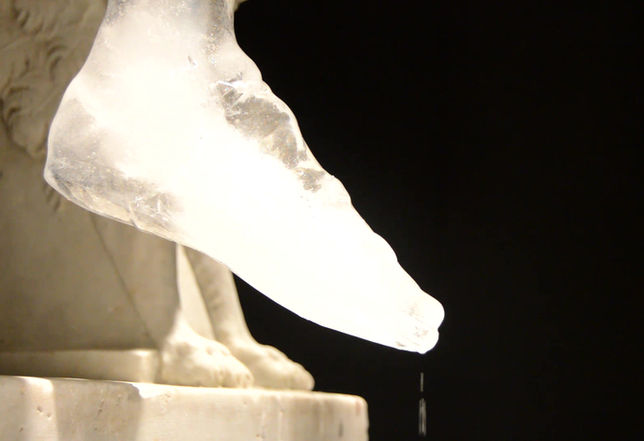
Fernando Foglino is a published artist, poet and author, and an architect who traverses the visual world with a transdisciplinary approach that enjoys the knowledge acquired through extensive professional activity. The narrative that his work has traced is deeply rooted in the domains of fine arts, history and social history and the cultural heritage present in forms of material culture (i.e.: monuments and institutional buildings), and in the problematisation of ethical issues and the political and symbolic meanings crystallised in these very forms. Foglino fuses these domains not only in a highly inquisitive manner and with intellectual rigour, but also with the recurrent use of the technologies of 3D scanning and printing.
Foglino's work brings the civic space into the gallery, in an attempt to awaken cultural memory to respect and appreciate art and public heritage. It is predominantly site-specific, and explores the historical, architectural specificities of buildings and the urban location and/or displacement of monuments. At the same time, his work consciously overlaps this type of investigation with the ideologies and socio-political values (or the lack or disrespect of such intangible constructs) inscribed (or erased) in these representations of material culture.
The works of this Uruguayan artist can draw inspiration from international names in the field of poetry, from the construction of the Nation as an intangible value that is based on conceptualisations such as 'civil rights', 'citizenship', the Constitution - just to name a few, and from the historical lineages of local art and art historiography. Conceptually sound, Foglino's visual output is not only an act of intuitive creativity and the result of remarkable aesthetic perception, but is also the result of extensive research in libraries and archives.
Textual and cinematic narratives can be a source of inspiration and determine the direction this juxtaposition can take, such as the work of Chilean poet Raul Zurita and Federico Fellini's 1972 film 'Roma'. Thanks to his interest in literature and film, approached imaginatively and philosophically articulated, Foglino reveals the possibility of coexistence, within material expressions, of past paradigms and sets of beliefs with the reinterpretation of that past through the critical lens of contemporary vision.
The result is a sculptural production that operates as cultural critique through its strong evocative appeal and its intense way of conveying the notion of heritage and cultural belonging to a shared history; or the narrative of such culture and history. Functioning as commentators and witnesses to past historical fragments, these sculptures awaken in their viewers memories about a collective past. But they also crystallise notions that characterise postmodernity and contemporary conditions such as the 'simulacrum', the copy and the replica as a democratising value; as the global commercial structure that creates links and exchanges between economies; and as the impact of the digital revolution and technological advancement on society and the art world.
Highlights of Foglino's artistic career are his participation in the Havana Biennale (2019), the III Montevideo Biennale (2016) and 'The Wrong', International New Digital Biennale (2013). His institutional presence includes appearances at the prestigious Espacio de Arte Contemporáneo (EAC) (2011 to 2018) and the Figari Museum in Montevideo (2015), a solo exhibition at MARCO Museo de Arte Contemporáneo de la Boca (2019), and group art exhibitions at the Beijing Contemporary Art Culture Centre and MUME Museo de la Memoria in Montevideo (both in 2018). Foglino had a two-month residency in Berlin through the Goethe Institute in 2019 and another of the same duration in Paris through the coveted Grand Prix Paul Cezanne, an award that the French Embassy in Uruguay gives to outstanding artists to support their work and research. 2019 was also the year in which Foglino won the 1st prize of the Montevideo Prize for Visual Arts, awarded by the Uruguayan Department of Culture. In 2021he was in a residency in Milan at the Via Farini cultural association, a platform for experimentation and cultural exchange that has hosted artists subsequently recognised internationally, such as Maurizio Cattelan, and ahs shown work by Vito Acconci, Marina Abramovic and Martin Creed, to name but a few.
By Kalinca Costa Söderlund











